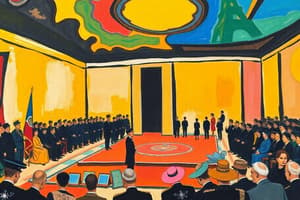Podcast
Questions and Answers
What was the main purpose of the Paris Peace Conference?
What was the main purpose of the Paris Peace Conference?
- To establish new trade agreements between nations.
- To form an alliance against future wars.
- To end ongoing military operations in Europe.
- To discuss how to redistribute territories lost by the Central Powers. (correct)
Why was the United States referred to as an Associated Power during World War I?
Why was the United States referred to as an Associated Power during World War I?
- It provided financial support to the Central Powers.
- It entered the war after the main alliances were formed.
- It acted independently without adhering to Allied agreements. (correct)
- It did not have any military involvement in the war.
Which countries were part of the 'Big Four' at the Paris Peace Conference?
Which countries were part of the 'Big Four' at the Paris Peace Conference?
- Japan, Spain, Belgium, and Greece.
- China, Brazil, Canada, and South Africa.
- Germany, Austria, Hungary, and Russia.
- United Kingdom, France, United States, and Italy. (correct)
What was a significant conflict during the negotiations of the Treaty of Versailles?
What was a significant conflict during the negotiations of the Treaty of Versailles?
Which countries were notably absent from the Paris Peace Conference?
Which countries were notably absent from the Paris Peace Conference?
What was one of Woodrow Wilson's significant objections during the negotiations at the Paris Peace Conference?
What was one of Woodrow Wilson's significant objections during the negotiations at the Paris Peace Conference?
How did the absence of Russia impact the negotiations at the Paris Peace Conference?
How did the absence of Russia impact the negotiations at the Paris Peace Conference?
Which statement best describes a goal of the Paris Peace Conference?
Which statement best describes a goal of the Paris Peace Conference?
What role did the 'Big Four' play during the Paris Peace Conference?
What role did the 'Big Four' play during the Paris Peace Conference?
What was a consequence of the Bolshevik Government's decision to repudiate financial debts?
What was a consequence of the Bolshevik Government's decision to repudiate financial debts?
Flashcards are hidden until you start studying
Study Notes
Paris Peace Conference
- Armistice ending WWI was signed on November 11, 1918, at 11 am.
- Paris Peace Conference took place in January 1919 in Versailles, near Paris.
- Nearly thirty nations participated, with the "Big Four" (United Kingdom, France, United States, Italy) playing a dominant role.
- The primary aim of the conference was to establish peace terms post-WWI.
Treaty of Versailles
- Negotiations were complicated by the differing interests of the "Big Four."
- The UK, France, and Italy fought as Allied Powers, while the U.S. entered as an Associated Power, rejecting many pre-existing Allied agreements.
- President Woodrow Wilson opposed many of the territorial arrangements proposed by the Allies.
Exclusions and Absences
- Russia, once an ally, withdrew in December 1917 under the Bolshevik regime and was excluded from the conference.
- The Allies refused to recognize the new Bolshevik Government and excluded the defeated Central Powers: Germany, Austria-Hungary, Turkey, and Bulgaria.
Key Provisions of the Treaty
- Germany was subjected to heavy punitive measures per French and British demands.
- Required Germany to surrender about 10% of its territory and all overseas colonies.
- Danzig and the coal-rich Saarland were placed under League of Nations administration, with France exploiting Saarland's resources until 1935.
- German military size was heavily restricted, and high-ranking officials, including Kaiser Wilhelm II, were subject to war crimes trials.
- Article 231, known as the "guilt clause," forced Germany to accept sole responsibility for the war and pay reparations.
Reparations and German Response
- Determined reparations amount was 132 billion gold Reichmarks (approx. 32 billion U.S. dollars), plus an initial $5 billion.
- Many Germans resented the treaty and considered it humiliating, leading to feelings of vulnerability.
- Initial refusal to pay reparations occurred until France and Britain invaded in January 1921.
- To protest, the German navy sank ships instead of surrendering them.
- Loss of territory and military power deepened national humiliation and economic fears.
- Clause 231 fueled anger over perceived unjust blame for the war, severely affecting national pride.
Paris Peace Conference
- Armistice ending WWI was signed on November 11, 1918, at 11 am.
- Paris Peace Conference took place in January 1919 in Versailles, near Paris.
- Nearly thirty nations participated, with the "Big Four" (United Kingdom, France, United States, Italy) playing a dominant role.
- The primary aim of the conference was to establish peace terms post-WWI.
Treaty of Versailles
- Negotiations were complicated by the differing interests of the "Big Four."
- The UK, France, and Italy fought as Allied Powers, while the U.S. entered as an Associated Power, rejecting many pre-existing Allied agreements.
- President Woodrow Wilson opposed many of the territorial arrangements proposed by the Allies.
Exclusions and Absences
- Russia, once an ally, withdrew in December 1917 under the Bolshevik regime and was excluded from the conference.
- The Allies refused to recognize the new Bolshevik Government and excluded the defeated Central Powers: Germany, Austria-Hungary, Turkey, and Bulgaria.
Key Provisions of the Treaty
- Germany was subjected to heavy punitive measures per French and British demands.
- Required Germany to surrender about 10% of its territory and all overseas colonies.
- Danzig and the coal-rich Saarland were placed under League of Nations administration, with France exploiting Saarland's resources until 1935.
- German military size was heavily restricted, and high-ranking officials, including Kaiser Wilhelm II, were subject to war crimes trials.
- Article 231, known as the "guilt clause," forced Germany to accept sole responsibility for the war and pay reparations.
Reparations and German Response
- Determined reparations amount was 132 billion gold Reichmarks (approx. 32 billion U.S. dollars), plus an initial $5 billion.
- Many Germans resented the treaty and considered it humiliating, leading to feelings of vulnerability.
- Initial refusal to pay reparations occurred until France and Britain invaded in January 1921.
- To protest, the German navy sank ships instead of surrendering them.
- Loss of territory and military power deepened national humiliation and economic fears.
- Clause 231 fueled anger over perceived unjust blame for the war, severely affecting national pride.
Studying That Suits You
Use AI to generate personalized quizzes and flashcards to suit your learning preferences.




